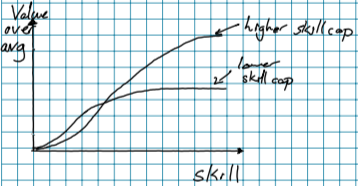EDIT: I'm only going to answer a few more questions, due to time constraints. I might eventually come back and answer more. I still appreciate getting replies with people's thoughts on things I've written.
I'm going to do an AMA on Tuesday next week (November 19th). Below I've written a brief description of what I'm doing at the moment. Ask any questions you like; I'll respond to as many as I can on Tuesday.
Although I'm eager to discuss MIRI-related things in this AMA, my replies will represent my own views rather than MIRI's, and as a rule I won't be running my answers by anyone else at MIRI. Think of it as a relatively candid and informal Q&A session, rather than anything polished or definitive.
----
I'm a researcher at MIRI. At MIRI I divide my time roughly equally between technical work and recruitment/outreach work.
On the recruitment/outreach side, I do things like the following:
- For the AI Risk for Computer Scientists workshops (which are slightly badly named; we accept some technical people who aren't computer scientists), I handle the intake of participants, and also teach classes and lead discussions on AI risk at the workshops.
- I do most of the technical interviewing for engineering roles at MIRI.
- I manage the AI Safety Retraining Program, in which MIRI gives grants to people to study ML for three months with the goal of making it easier for them to transition into working on AI safety.
- I sometimes do weird things like going on a Slate Star Codex roadtrip, where I led a group of EAs as we travelled along the East Coast going to Slate Star Codex meetups and visiting EA groups for five days.
On the technical side, I mostly work on some of our nondisclosed-by-default technical research; this involves thinking about various kinds of math and implementing things related to the math. Because the work isn't public, there are many questions about it that I can't answer. But this is my problem, not yours; feel free to ask whatever questions you like and I'll take responsibility for choosing to answer or not.
----
Here are some things I've been thinking about recently:
- I think that the field of AI safety is growing in an awkward way. Lots of people are trying to work on it, and many of these people have pretty different pictures of what the problem is and how we should try to work on it. How should we handle this? How should you try to work in a field when at least half the "experts" are going to think that your research direction is misguided?
- The AIRCS workshops that I'm involved with contain a variety of material which attempts to help participants think about the world more effectively. I have thoughts about what's useful and not useful about rationality training.
- I have various crazy ideas about EA outreach. I think the SSC roadtrip was good; I think some EAs who work at EA orgs should consider doing "residencies" in cities without much fulltime EA presence, where they mostly do their normal job but also talk to people.


I think your sense is correct. I think that plenty of people have short docs on why their approach is good; I think basically no-one has long docs engaging thoroughly with the criticisms of their paths (I don't think Paul's published arguments defending his perspective count as complete; Paul has arguments that I hear him make in person that I haven't seen written up.)
My guess is that it's developed because various groups decided that it was pretty unlikely that they were going to be able to convince other groups of their work, and so they decided to just go their own ways. This is exacerbated by the fact that several AI safety groups have beliefs which are based on arguments which they're reluctant to share with each other.
(I was having a conversation with an AI safety researcher at a different org recently, and they couldn't tell me about some things that they knew from their job, and I couldn't tell them about things from my job. We were reflecting on the situation, and then one of us proposed the metaphor that we're like two people who were sliding on ice next to each other and then pushed away and have now chosen our paths and can't interact anymore to course correct.)
Should we be concerned? Idk, seems kind of concerning. I kind of agree with MIRI that it's not clearly worth it for MIRI leadership to spend time talking to people like Paul who disagree with them a lot.
Also, sometimes fields should fracture a bit while they work on their own stuff; maybe we'll develop our own separate ideas for the next five years, and then come talk to each other more when we have clearer ideas.
I suspect that things like the Alignment Newsletter are causing AI safety researchers to understand and engage with each other's work more; this seems good.